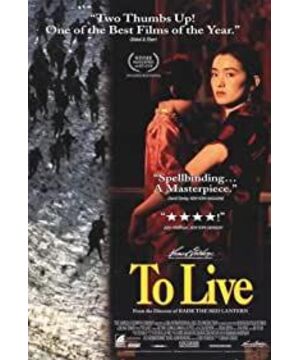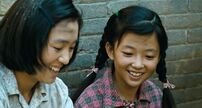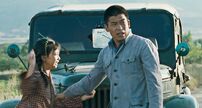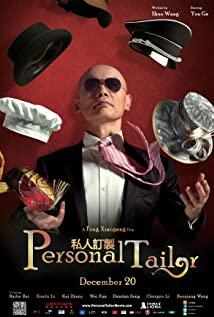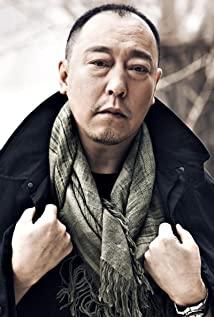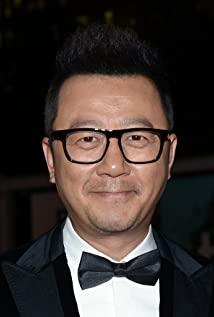Such a funny explanation, such a lovely dialogue between father and son, infiltrated in "Alive" in a simple way, so truly showing the special social culture and the imprint of that special era.
"Alive" is a film adapted from Yu Hua's novel by Zhang Yimou in 1994. It tells the fate of an ordinary family during the unforgettable years in the context of the great social changes in China in the 20th century. The film chronicles the changes in the world during the historical period from the 1940s, before the founding of the People's Republic of China, to the early 1970s. The protagonist of the film is Xu Fugui, a fallen master who makes shadow puppetry as a business. It is the box of shadow puppets in Fugui's hands, which runs through the whole film and witnesses the ups and downs of the protagonist's fate. The historical process of nearly 30 years before and after - the civil war between the Kuomintang and the Communist Party, the founding of the People's Republic of China, the land reform in the 1950s and 1960s, the anti-rightist movement, the Great Leap Forward and the Cultural Revolution and a series of political movements - every major event directly Hit the nerves of this family's life.
Fugui, who was born in a wealthy landlord family in the 1940s,
was obsessed with gambling and stayed up all night, arrogantly ignoring his wife's advice, and finally lost all his family property to the shadow puppet master Long Er. His wife left him with his daughter, and his father scolded him for being unfilial. But what is dramatic is that during the Cultural Revolution in the 1960s, Long Er died because he was put on a landlord's hat and criticized for the house of a rich family. The film deliberately magnifies this ironic ending. The great sadness and joy in the rich and noble’s heart from fear to happiness is vividly expressed by Ge You, and it also reflects the great changes in social structure and social status caused by various social and political movements since the founding of New China. , social roles, and earth-shaking changes in social systems. As Mills, C. Wright put it, a distant and unrecognized structural change may be shaping our collective existence and each individual's "personal biography."
In the 1950s, the
camera went to the 1950s. In that turbulent era, New China had just been established, breaking the thousand-year-old feudal social system. People were enthusiastic and carried out land reforms, realizing the dream of the Taiping Heavenly Kingdom period. There is food for it."
Later, in 1958, the Great Leap Forward Movement was in the most difficult period of a series of economic reforms. The state called on the whole people to mobilize all people to complete the infrastructure construction of industry and agriculture in a self-reliant way, and strive to catch up with the industrialized Western world within 15 years. The private ownership of peasants’ land during the original local reform period was essentially replaced by public ownership (a strict household registration system was also established at this time), and the land was owned by the commune, and everyone had a big pot of rice and was supported by the commune. The establishment of large-scale public-owned agricultural cooperatives broke the traditional single-family life model, and the powerful mobilization forces under the highly centralized power made the mass steel-making movement in full swing. According to Mao Zedong's utopian ideal of sacrificing hard work and realizing communism as soon as possible, he put forward the national goal of "three years of hard work and one thousand years of enjoyment". However, the following three years of natural disasters and other facts also proved that in the process of restructuring the social structure, especially the economic structure, too much attention was paid to the relations of production and the superstructure, while ignoring the productive forces themselves, which violated Marx's understanding of productive forces and production. The theory that relationships should be adapted, social resources are ineffectively wasted and overutilized. "How bold the people are, how productive the land is", "surpassing Britain and catching up with the United States", now it seems that this kind of utopian socialism that is separated from the productive forces is a sign of the times that does not conform to the law! This seemingly planned social change under the will of the state has not made society progress, but has made it stagnant or even retrogressive.
The first tragedy told in the film is the unexpected death of Fugui and Jiazhen's son Youqing. The people's communes and mass steelmaking in the film reflect the basic outline of the Great Leap Forward. This is a social movement, including Xu Fugui’s family who participated in the smelting labor organized in the local primary school day and night. Fugui entertained the workers by performing shadow puppets with his own craftsmanship, and Jiazhen brought them tea and water, and even children. Participated in the work of staying up all night. According to the clues laid out in the video, because the district chief was about to come to the township for inspection, the Xu family was told to go back to school to participate in the next night's labor. Even though the parents realized their child was exhausted, they reluctantly woke Youqing and walked all the way to school. Fugui carried the sleepy and confused Youqing on his back, and he was still mobilizing his energy for the night labor along the way. That night, the exhausted Youqing was accidentally hit and killed by the mayor's car while he was sleeping. The exhaustion of the mayor of Youqinghe caused by overwork is a direct consequence of the tragedy that led to Youqing's death.
Is this unexpected coincidence the fault of Chunsheng's fatigued driving? Is it Fugui's fault for forcing Youqing to go to school to make steel? Or is it simply the Great Leap Forward, the sin of that era?
When a loved one passes away in an unnatural way, living people often say, "If he doesn't..., he won't leave..." But life, after all, is not the "virtual life" in computer games, losing, despairing, Can do it all over again. What if it doesn't work? No "steel refining" mania? Did Wang Chunsheng's car hit the wall? Did You Qing fall asleep under the wall? Or did Jiazhen insist on preventing Fugui from sending Youqing to school? There may be infinite possibilities, but there may be inevitability hidden in the accident, the inevitability of that era, it can be said that this is completely a social and political tragedy.
The second tragedy that befell the family in the 1960s
was the death of daughter Fengxia in childbirth, and the film also reached the climax of the entire plot at this time.
The plot of Fengxia's production in the hospital in the film shows the state of chaos and disorder throughout the country during the "permanent revolution" period. The traditional social values and ethics have been overturned, big-character posters are flying all over the streets, and even the prison slogan is "Long live the red terror!
" The parents and husband were very worried, because the little Red Guard doctors who stayed behind to see the doctor were too young and inexperienced, which is exactly what caused the tragedy of Fengxia's death due to complications during childbirth. Fengxia suffered heavy postpartum hemorrhage, and the doctors who only prepared for student qualifications were flustered and at a loss. The revolutionary who was still arrogant before suddenly turned into a frightened child who ran back and forth helplessly, leaving Fengxia to lose blood and die. Poor Fengxia, her life was buried in the childish hands of a few revolutionary nurses from the medical school. The "reactionary academic authority" who has been criticized for three days without food in the bullpen At this time, Professor Wang was ironic because he choked and fainted after drinking water after swallowing 7 steamed buns in a row. Later, the story of 7, 7, 49 steamed buns made people listen to it. Thoughts.
In fact, those little red guards are also a tragedy. They should have been in the learning process of social roles, but because of the transformation of society and the changes in the value system, they are at a loss. The old social system has been broken and new social norms have not yet been formed. Social norms The misleading of the society has caused social anomie, which will have a great impact on their whole life.
At this time, we are feeling the pure enthusiasm of people in that era. You can burn the precious shadow puppets for a long time for the phrase "to destroy the four olds and establish the four new ones" and "the older the things are, the more reactionary they are." The shells hit Chiang Kai-shek's bed, the second hit the dining table of Chiang Kai-shek's house, and the third hit the kennel of Chiang Kai-shek's house." You can honestly and sincerely face the golden statue of Chairman Mao painted on the wall. Said: "Chairman Mao is an old man, I took Comrade Xu Fengxia away." Naturally pious, without the slightest pretense. Sometimes, this kind of simplicity is even fascinating, but it is not so much a desirable simplicity, it is better to say that it is a national shock under the will of the country. We stopped thinking and listened to the loudspeaker all day long, believing that we have put it on the shelf. Maoism has thrown away thousands of years of excellent moral traditions, and ruthlessly trampled on cultural treasures that have been passed down for thousands of years. As Yu Hua said: "It was an era of repressed instincts, tragic fate, and crazy spirits. Just like the Middle Ages in Europe, it was also an era of ethical subversion, all beings, and impetuous indulgence. A Westerner can only experience it after living for four hundred years. In a world of worlds, a Chinese person only needs 40 years."
"Alive" is like an epic, this epic is wrapped in the fate of individuals and families under the tide of red culture, and it is faintly revealed A tinge of sympathy and sad black humor. The personal living conditions and sufferings in the film reflect the joys and sorrows of little people and the absurdity of the times in a simplified historical background. The director also uses the small and big folk narrative to reflect on and mock the once epic and mythical China, reflecting on the return of human nature, the construction of national image and the changes in social ideology. Understand and explain the operation of society, the practice of state power, and the promotion of ideology through personal life, and explain why ordinary people who are obsessed with "living" are motivated to participate in political rituals, and finally political and moral concepts are used. Internalization, the people of almost the entire country are in a state of unconsciousness, explain how to transform the entire country from a traditional ritual state to a "theater state" with display and performance as the political model, and change people's actions Logic and even the process and reasons for reshaping Chinese national character.
The ending of the film is not as tragic as the novel. In the novel, only the grandfather and grandson are left with each other for life. The movie is slightly gentle, but it is also quite thought-provoking. Fugui's life is a process of gradual evolution, just like the process of changes in Chinese society. The despair, helplessness, and powerlessness in the film are transformed in black humor and become the Chinese people's enduring in a difficult state of existence. To live is to endure, to endure the responsibilities that life gives us, to endure the happiness and suffering, boredom and mediocrity that reality gives us. Yu Hua once wrote in the preface of the novel: People live for living itself, not for anything other than living. Maybe this is the understanding of people's life at that time, I just hope that it will not become the reality of people's survival in modern society.
When the steamed buns grow up, they will catch up with the good times. . . . . .
View more about To Live reviews


